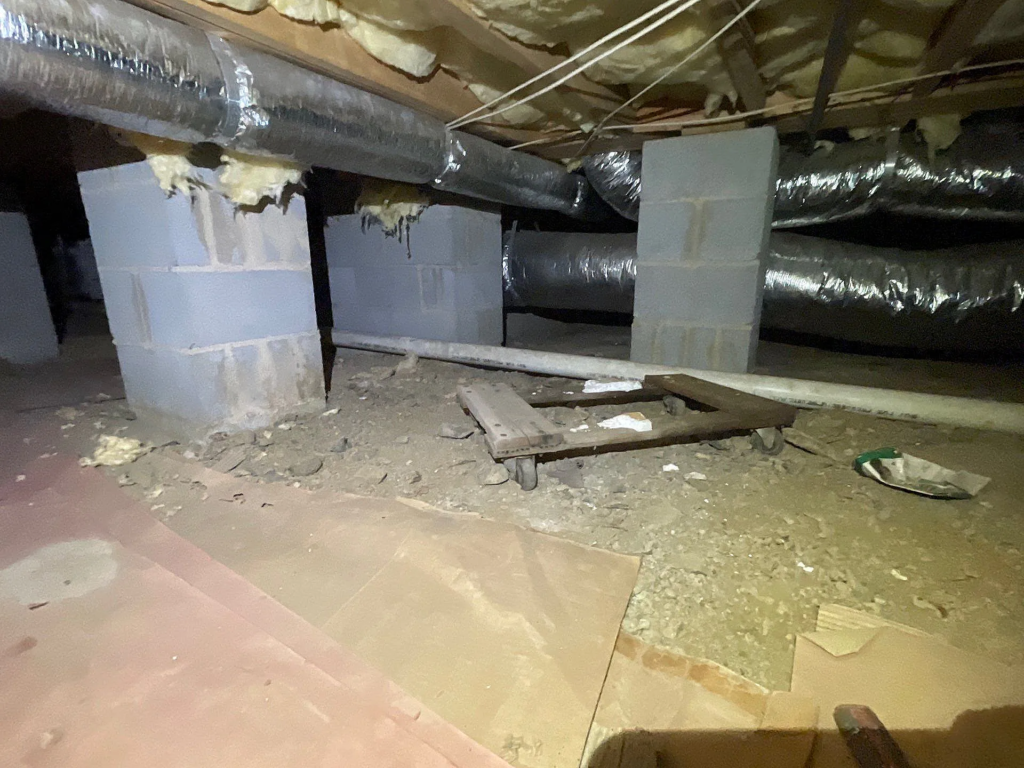When you're buying a new home, it’s easy to focus on the big things—kitchens, bathrooms, square footage, and curb appeal. But what’s under your feet matters just as much as what’s in front of your eyes. That’s where the crawlspace comes in.
A crawlspace is a shallow area beneath the home that provides access to plumbing, wiring, and HVAC systems. But it’s more than just a utility zone—it plays a crucial role in the health, safety, and long-term durability of your entire home.
Here’s why:
Think of your crawlspace like the engine of your home. You wouldn’t buy a car without checking under the hood—so don’t buy a home without knowing what’s going on underneath.

A general home inspection will usually include a crawlspace check—but here’s the kicker: not all inspectors go deep enough (literally or figuratively). That’s why it’s smart to know what red flags to watch for or ask about during the home buying process.
Here are some of the most common crawlspace issues that should raise concern:
A telltale sign of moisture problems. If it smells like a damp basement or gym socks, there’s likely mold or mildew lurking underneath.
Water should never be sitting in your crawlspace. This can indicate poor drainage, foundation issues, or grading problems around the home.
If you see black, white, or green patches on wood or insulation, that’s a sign of active mold. This isn’t just a crawlspace problem—it’s a health problem.
Insulation that’s falling, soaked, or chewed up by pests indicates long-term neglect. It also means the home is likely losing energy.
These are signs that moisture has been doing damage for a while. Left unchecked, this can weaken the very structure holding the house up.
Droppings, chewed materials, nests, or tunnels suggest rodents, insects, or termites have made themselves at home.
If any of these red flags show up in an inspection report—or if the crawlspace wasn’t inspected at all—it’s worth bringing in a crawlspace specialist (hey, that’s us 👋) for a deeper look before moving forward.
So you’ve spotted some crawlspace red flags—or maybe you’re not sure what they mean. Here’s the part most homebuyers don’t realize: crawlspace problems don’t stay in the crawlspace. They creep into your living areas, your wallet, and your long-term peace of mind.
Let’s break down the real-world impact:
Moisture, rot, and shifting soil in the crawlspace can lead to sagging floors, cracked walls, and foundation damage. Left unaddressed, these repairs can cost thousands—and that’s before you factor in permits, time delays, or lost home value.
Remember, up to 40% of the air you breathe comes from your crawlspace. Mold spores, musty smells, and even pest allergens can circulate through your HVAC system, affecting your family’s health—especially for kids, seniors, or anyone with allergies.
Unsealed crawlspaces let in humid air during the summer and cold air in the winter, forcing your HVAC system to work overtime. That means less comfort and more $$$ out the door every month.
Moist, dark environments are an open invitation to termites, rodents, and insects. Once they’re in your crawlspace, it’s only a matter of time before they move upstairs. Pest control treatments alone won’t fix the source—you need to fix the space.
If you’re buying a home with a neglected crawlspace, just know that it could affect your resale down the line. Future buyers (and their inspectors) will spot these same issues—and could use them to negotiate your price down or walk away entirely.
The bottom line? Crawlspace problems are never just “down there.” They impact everything from your family’s comfort to your home’s financial future. The good news? With the right solutions, they’re totally fixable—and preventable.
We’re always excited to see more awareness being brought to crawlspace care—especially when it helps homeowners, buyers, and real estate professionals make smarter decisions.
Recently, we had the opportunity to be featured in a Redfin article that dives deep into what crawlspaces are, why they matter, and how to maintain them. While we’re not officially affiliated with Redfin, we’re proud to have contributed expert insight to help educate their readers.

Crawling into the Unknown: Your
Ultimate Guide to Crawl Spaces
Redfin | ApartmentGuide | Rent
So, the crawlspace inspection revealed a few (or a few too many) issues. Don’t panic—this isn’t a dealbreaker. In fact, it’s very common. The key is knowing what steps to take before closing, so you’re not blindsided after moving in.
Here’s what we recommend:
Home inspectors are great at identifying issues—but they’re not always equipped to fully diagnose or price crawlspace repairs. That’s where a specialist like Walsh comes in. We can provide a more detailed assessment and break down exactly what’s needed.
Whether it’s a simple moisture issue or something more serious like foundation shifting, it’s important to know:
This information is powerful in negotiations with the seller—or for planning your first upgrades post-move-in.
If significant repairs are needed, you may be able to:
Either way, a thorough crawlspace inspection gives you leverage and peace of mind.
One of the best ways to future-proof your new home? Encapsulation. Sealing your crawlspace keeps moisture, pests, and mold out—and can even improve your indoor air quality and energy efficiency.
A lot of homeowners forget the crawlspace once they move in. Don’t be that person! Preventive maintenance, including annual inspections and moisture checks, helps you stay ahead of problems before they become expensive.
Buying a home with crawlspace issues doesn’t mean walking away—it means walking in informed. With the right expert on your side, you can make repairs confidently and protect your investment from the ground up.
Buying a home is one of the biggest financial (and emotional) decisions you’ll ever make. And while it’s easy to get swept up in kitchen finishes and open floor plans, don’t forget to look down. What’s happening in the crawlspace can tell you more about your home’s health than you might think.
Whether you're a first-time buyer, a seasoned homeowner, or an investor eyeing your next property, the message is the same:
🔍 Don’t skip the crawlspace.
🛠️ Don’t ignore the red flags.
💡 Don’t be afraid to ask for expert help.
At Walsh Crawlspace & Structural Repair, we specialize in identifying and solving crawlspace and foundation issues before they become major headaches. Our team is here to make sure what’s under your home is just as solid as what’s above it.
We’ve got your back. Get a professional assessment so you can move forward with confidence.
📞 Call us at 704-302-7715
🌐 Or visit www.walshcrawlspace.com to schedule your inspection.